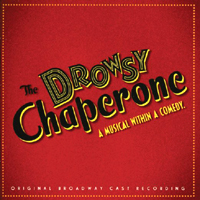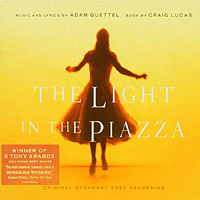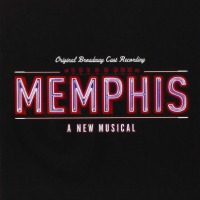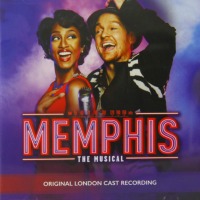 Original Broadway Cast, 2006 (Ghostlight)
Original Broadway Cast, 2006 (Ghostlight)  (3 / 5) This might be the first Broadway musical with commentary written into the script. Alone in his apartment, a musical theater devotee anonymously named Man in Chair plays the recording of one of his favorites, the (fictional) 1920s romp The Drowsy Chaperone. He then proceeds to provide footnotes on the stars and writers as we watch the show come to life in his apartment. On stage, it all worked beautifully and hilariously. With its dynamic original cast and inventive staging, The Drowsy Chaperone was unique in that it allowed those of us who adore musicals to see ourselves depicted on stage, while also giving us the benefit of watching a delightfully silly musical. But when taken out of the frame of the production, the score, by Lisa Lambert and Greg Morrison, proves to be merely decent. Though the songs are cute in their reminiscences of the jazzy musicals of the ’20s, they don’t move beyond hommage. The lyrics can be daffy and quirky (“Show Off”), but they never really channel the wit and sophistication of Lorenz Hart or Ira Gershwin. The music is light but fun, much helped by Larry Blank’s peppy, period appropriate orchestrations. The ensemble, clearly having a blast, revels in old school camp and bravado, and elevates the lyrics so that they seem more humorous than they are. Danny Burstein tastefully hams it up in “I Am Aldolpho,” Beth Leavel gleefully warbles Garland-style in “As We Stumble Along,” and Sutton Foster uses her star power to great effect in “Bride’s Lament.” But it’s co-librettist Bob Martin as the Man in Chair who shines brightest here. Though he has no song of his own, Martin offers anecdotes and opinions on the show within the show and its performers throughout the album. His commentary is hilarious and inventive, delivered with just the right touch of knowledge and enthusiasm. Overall, The Drowsy Chaperone is a highly enjoyable show and a fun album, but to quote the Man in Chair, “just ignore the lyrics.” — Matt Koplik
(3 / 5) This might be the first Broadway musical with commentary written into the script. Alone in his apartment, a musical theater devotee anonymously named Man in Chair plays the recording of one of his favorites, the (fictional) 1920s romp The Drowsy Chaperone. He then proceeds to provide footnotes on the stars and writers as we watch the show come to life in his apartment. On stage, it all worked beautifully and hilariously. With its dynamic original cast and inventive staging, The Drowsy Chaperone was unique in that it allowed those of us who adore musicals to see ourselves depicted on stage, while also giving us the benefit of watching a delightfully silly musical. But when taken out of the frame of the production, the score, by Lisa Lambert and Greg Morrison, proves to be merely decent. Though the songs are cute in their reminiscences of the jazzy musicals of the ’20s, they don’t move beyond hommage. The lyrics can be daffy and quirky (“Show Off”), but they never really channel the wit and sophistication of Lorenz Hart or Ira Gershwin. The music is light but fun, much helped by Larry Blank’s peppy, period appropriate orchestrations. The ensemble, clearly having a blast, revels in old school camp and bravado, and elevates the lyrics so that they seem more humorous than they are. Danny Burstein tastefully hams it up in “I Am Aldolpho,” Beth Leavel gleefully warbles Garland-style in “As We Stumble Along,” and Sutton Foster uses her star power to great effect in “Bride’s Lament.” But it’s co-librettist Bob Martin as the Man in Chair who shines brightest here. Though he has no song of his own, Martin offers anecdotes and opinions on the show within the show and its performers throughout the album. His commentary is hilarious and inventive, delivered with just the right touch of knowledge and enthusiasm. Overall, The Drowsy Chaperone is a highly enjoyable show and a fun album, but to quote the Man in Chair, “just ignore the lyrics.” — Matt Koplik
Monthly Archives: May 2016
The Light in the Piazza
 Original Broadway Cast, 2005 (Nonesuch)
Original Broadway Cast, 2005 (Nonesuch)  (5 / 5) The Light in the Piazza seemed to re-open the door for lush scores and musicals of honest sentiment of the type not seen since Rodgers and Hammerstein, at a time when modern musical theater writers were for the most part shying away from works of pure romance. Based on Elizabeth Spencer’s novel of the same title, the musical tells of Margaret Johnson, a Southern socialite, who takes her adult daughter, Clara, on vacation to Florence, Italy in the 1950s — only to have a local young man and Clara fall in love, despite Clara’s stunted mental maturity due to an accident in her childhood. For his Broadway debut, Adam Guettel wrote an overwhelmingly romantic score, rich in musical complexity and tender in its poetically precise lyrics, a fair percentage of which are in Italian in order to properly dramatize the native characters. Guettel uses the language and cultural barriers between the Johnsons and the Italians to his advantage by employing a musical language that is distinctly modern in structure, yet traditionally sweeping in sound. (Guettel and Ted Sperling are responsible for the fluid orchestrations.) Piazza is moving in its beauty, whether in its more intimate moments (“Dividing Day,” “The Beauty Is”) or its grander songs (“Il Mondo Era Vuoto,” “Say It Somehow”). The cast is exceptional, with Kelli O’Hara and Matthew Morrison providing touching, lovely performances as the two young lovers. But it’s Victoria Clark as Margaret who defines the album. Her delivery of the final song, “Fable,” in which Margaret prepares to finally let Clara go, would be reason enough to own this recording. The Light in the Piazza is a masterwork given a definitive presentation on the cast album — Matt Koplik
(5 / 5) The Light in the Piazza seemed to re-open the door for lush scores and musicals of honest sentiment of the type not seen since Rodgers and Hammerstein, at a time when modern musical theater writers were for the most part shying away from works of pure romance. Based on Elizabeth Spencer’s novel of the same title, the musical tells of Margaret Johnson, a Southern socialite, who takes her adult daughter, Clara, on vacation to Florence, Italy in the 1950s — only to have a local young man and Clara fall in love, despite Clara’s stunted mental maturity due to an accident in her childhood. For his Broadway debut, Adam Guettel wrote an overwhelmingly romantic score, rich in musical complexity and tender in its poetically precise lyrics, a fair percentage of which are in Italian in order to properly dramatize the native characters. Guettel uses the language and cultural barriers between the Johnsons and the Italians to his advantage by employing a musical language that is distinctly modern in structure, yet traditionally sweeping in sound. (Guettel and Ted Sperling are responsible for the fluid orchestrations.) Piazza is moving in its beauty, whether in its more intimate moments (“Dividing Day,” “The Beauty Is”) or its grander songs (“Il Mondo Era Vuoto,” “Say It Somehow”). The cast is exceptional, with Kelli O’Hara and Matthew Morrison providing touching, lovely performances as the two young lovers. But it’s Victoria Clark as Margaret who defines the album. Her delivery of the final song, “Fable,” in which Margaret prepares to finally let Clara go, would be reason enough to own this recording. The Light in the Piazza is a masterwork given a definitive presentation on the cast album — Matt Koplik
Memphis
 Original Broadway Cast, 2009 (Rhino)
Original Broadway Cast, 2009 (Rhino)  (3 / 5) Winner of 2010 Tony Awards for Best Musical, Book, Original Score, and Orchestrations, Memphis charts an enjoyable journey through the pioneering days of rock ‘n’ roll, when rhythm and blues morphed into a new musical genre mixing black and white influences and exciting young, integrated audiences. Set in the 1950s, when racial segregation was still the norm in much of America, the energetic musical’s plot centers around a Memphis-based, white DJ, Huey Calhoun (Chad Kimball), who is enamored of and daringly promotes African-American music. He soon falls in love with a black female singer (Montego Glover) and jump-starts her rise to stardom. Joe DiPietro’s serviceable book frames an invigorating score, with music by Bon Jovi’s David Bryan and lyrics by Bryan and DiPietro. The songs recall iconic rock performers, sounds (guitar riffs, doo-wop harmonizing, soulful blues), and hits of the period; at least three numbers sound remarkably like “Jailhouse Rock.” Yet these references are packaged within a score that’s structured Broadway-style, featuring dramatic solos enhanced by solid ensemble singing, colorful orchestrations, wordy (sometimes overly so) lyrics, and infectious dance breaks. The cast album highlights come at the beginning and the end. The opening jump blues number, “Underground,” is followed by the searing ballad “The Music of My Soul,” and these songs let us know we’re in for a rebellious ride through rough racial terrain, while the catchy “Everybody Wants to Be Black on a Saturday Night” gets us gleefully on board. Heightening the show’s bittersweet climax, when the lovers part, “Memphis Lives in Me” salutes Huey’s hometown and all it represents emotionally, culturally, and musically. The upbeat finale, “Steal Your Rock ‘n’ Roll,” exemplifies the score’s accessible if unimaginative blend of pop appeal, Broadway pizzazz, and early rock sensibilities. Throughout, Kimball sings Huey’s songs with scratchy grit and raw expressiveness; his superb acting contributed immeasurably to the musical’s success on Broadway. As Felicia, the singer who captures Huey’s heart, Glover offers dramatically nuanced versions of the showpieces “Colored Woman” and “Love Will Stand When All Else Fails.” — Lisa Jo Sagolla
(3 / 5) Winner of 2010 Tony Awards for Best Musical, Book, Original Score, and Orchestrations, Memphis charts an enjoyable journey through the pioneering days of rock ‘n’ roll, when rhythm and blues morphed into a new musical genre mixing black and white influences and exciting young, integrated audiences. Set in the 1950s, when racial segregation was still the norm in much of America, the energetic musical’s plot centers around a Memphis-based, white DJ, Huey Calhoun (Chad Kimball), who is enamored of and daringly promotes African-American music. He soon falls in love with a black female singer (Montego Glover) and jump-starts her rise to stardom. Joe DiPietro’s serviceable book frames an invigorating score, with music by Bon Jovi’s David Bryan and lyrics by Bryan and DiPietro. The songs recall iconic rock performers, sounds (guitar riffs, doo-wop harmonizing, soulful blues), and hits of the period; at least three numbers sound remarkably like “Jailhouse Rock.” Yet these references are packaged within a score that’s structured Broadway-style, featuring dramatic solos enhanced by solid ensemble singing, colorful orchestrations, wordy (sometimes overly so) lyrics, and infectious dance breaks. The cast album highlights come at the beginning and the end. The opening jump blues number, “Underground,” is followed by the searing ballad “The Music of My Soul,” and these songs let us know we’re in for a rebellious ride through rough racial terrain, while the catchy “Everybody Wants to Be Black on a Saturday Night” gets us gleefully on board. Heightening the show’s bittersweet climax, when the lovers part, “Memphis Lives in Me” salutes Huey’s hometown and all it represents emotionally, culturally, and musically. The upbeat finale, “Steal Your Rock ‘n’ Roll,” exemplifies the score’s accessible if unimaginative blend of pop appeal, Broadway pizzazz, and early rock sensibilities. Throughout, Kimball sings Huey’s songs with scratchy grit and raw expressiveness; his superb acting contributed immeasurably to the musical’s success on Broadway. As Felicia, the singer who captures Huey’s heart, Glover offers dramatically nuanced versions of the showpieces “Colored Woman” and “Love Will Stand When All Else Fails.” — Lisa Jo Sagolla
 Original London Cast, 2015 (First Night)
Original London Cast, 2015 (First Night)  (3 / 5) Five years after it opened on Broadway, Memphis played for a year on London’s West End. Though one can detect slight differences in the arrangements, orchestrations, and tempi of several songs, the only significant dissimilarities between the Broadway and London cast albums lie in the singing of the lead performers. As Huey, a character loosely inspired by the trailblazing, Memphis-based, white DJ Dewey Phillips (who championed black music), Killian Donnelly offers smoother, prettier, more technically polished singing than Chad Kimball in his renditions of the heartfelt “The Music of My Soul” and “Memphis Lives in Me,” as well as the wild “Crazy Little Huey.” Beverley Knight sings Felicia’s songs with greater authority than Montego Glover, perhaps too much authority for the vulnerable character. Overall, the Broadway album proves more effective as theater music; there’s more variety among the vocal qualities of the cast members, so their characters come through with greater distinction. “She’s My Sister,” a heated duet between Huey and Felicia’s brother, generates less tension on the London album and is harder to follow because the performers’ voices don’t contrast as forcefully as do those of their Broadway counterparts. But whereas the Broadway album offers a superfluous bonus track of Memphis composer/co-lyricist David Bryan singing “The Music of My Soul” over his own too-loud piano accompaniment, the London recording’s bonus is an impressive performance by Bryan of “Memphis Lives in Me.” — L.J.S.
(3 / 5) Five years after it opened on Broadway, Memphis played for a year on London’s West End. Though one can detect slight differences in the arrangements, orchestrations, and tempi of several songs, the only significant dissimilarities between the Broadway and London cast albums lie in the singing of the lead performers. As Huey, a character loosely inspired by the trailblazing, Memphis-based, white DJ Dewey Phillips (who championed black music), Killian Donnelly offers smoother, prettier, more technically polished singing than Chad Kimball in his renditions of the heartfelt “The Music of My Soul” and “Memphis Lives in Me,” as well as the wild “Crazy Little Huey.” Beverley Knight sings Felicia’s songs with greater authority than Montego Glover, perhaps too much authority for the vulnerable character. Overall, the Broadway album proves more effective as theater music; there’s more variety among the vocal qualities of the cast members, so their characters come through with greater distinction. “She’s My Sister,” a heated duet between Huey and Felicia’s brother, generates less tension on the London album and is harder to follow because the performers’ voices don’t contrast as forcefully as do those of their Broadway counterparts. But whereas the Broadway album offers a superfluous bonus track of Memphis composer/co-lyricist David Bryan singing “The Music of My Soul” over his own too-loud piano accompaniment, the London recording’s bonus is an impressive performance by Bryan of “Memphis Lives in Me.” — L.J.S.

